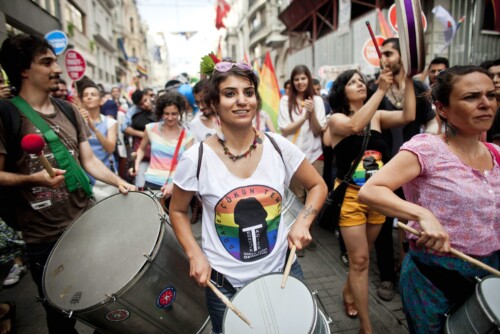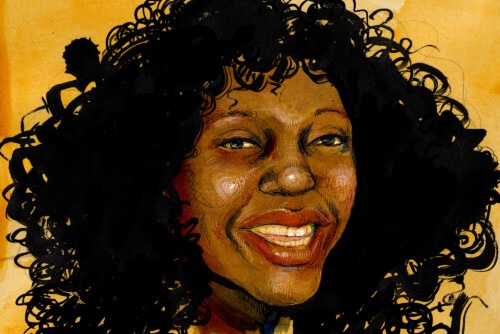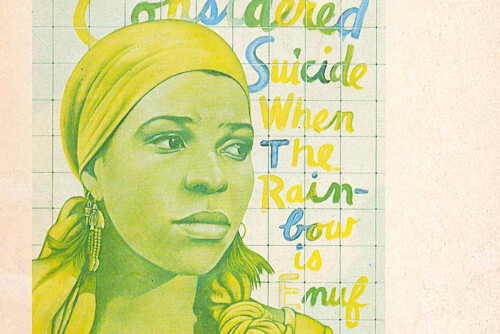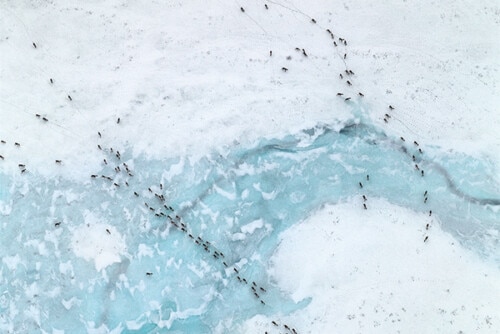Karma proposed this idea to special issue editors, Gema and Brenna, for selfish reasons: She wanted an opportunity to create and facilitate a conversation between some of the queer activists from around the world that she admires most. The questions she wanted to ask them centered on how they understand what they do as queer and as transnational—if they understand it that way at all—and how those terms function differently in their particular work. While a conversation began in a digital forum, due to busy schedules and travel, it quickly stalled. Not wanting to end the discussion there, Karma decided to interview each activist individually and bring Hana on board to help transcribe those interviews and assemble a dialogue of sorts. The final (but, of course, ongoing) product here results from our process of combining initial pieces of the digital conversation with edited selections from each interview on the original proposed themes.
We have organized the dialogue around the terms originally proposed for the theme of the special issue and that served as the framing mechanism for the forum and subsequent interviews. Using “transnational,” “queer,” and “activism” as points of departure allowed us to give extended consideration to the complexities and differential uses of each concept on its own terms before examining how they interact to become—however uneasily—”transnational queer activism.” We focused, in particular, on the moments in which participants’ words spoke to each other, whether in resonance or tension. By putting such points in proximity, we found that the moments that emerged produced fascinating and unexpected convergences such as the discussion about the translation of queer as Ku Er in Chinese pinyin and cuir in Spanish.
Putting these activists in conversation with each other helped to illustrate the very dis-ease among the terms that framed the discussion. Noting that in an era of globalization there is no reason why western gay identities would not be attractive around the world, Dennis Altman, in his landmark essay “Global Gaze/Global Gays,” wrote that, “The question is how to balance the impact of universalizing rhetoric and styles with the continuing existence of cultural and social traditions.” 1 Nearly two decades later, after strong critiques of homonationalism, the queer international, and gay imperialism, the questions are somewhat different 2 . Given the focus of this conversation, we might ask the following: From our many locales and sociopolitical positions, how should we think about the interplay between queer activism and transnationality? What are the risks and possibilities of different manifestations of these convergences? Whose viewpoints should be centered? Ultimately, such questions compel us to rethink conversations about transnational queer activism by developing more nuanced understandings of queer solidarity through and with difference. It is important to note that these interviews were conducted in the summer of 2015. We have updated the biographies, but we did not modify any of the original content from our conversations even as global political conditions, as well as parts of the participants’ lives, have changed. Despite such inevitable shifts, the insights offered in 2015 both capture an historical moment for each activist, and also remain very relevant in the present.
Participant Biographies
Fatima Jaffer: My ancestry is from Kutch India, where I have never lived. I was born in Mombasa under British colonization and grew up in post-independence Kenya a 4th-generation diasporic “Kenyan Asian” until my early 20s when my family migrated to Canada. I now live in Vancouver, Canada on unceded white-settler colonized Indigenous land, as a racialized diasporic “South Asian” activist, journalist and academic. By unceded, I mean the land of the province British Columbia, where Vancouver is situated, was never surrendered but taken by force from Indigenous peoples in Vancouver, collectively known as Coast Salish peoples, and settled. In other words, I’m now diasporic in a settler-colonial land. I identify locally as South Asian, but in some spheres and my heart, as diasporic Kenyan. Vancouver is also the site of my “coming out” in the commonly understood and least critically meant sense of the expression because I actually came out earlier in Kenya, before I “came out” as “lesbian.”
I worked as an alternative/feminist journalist and photo-journalist for about 30 years, in Vancouver and internationally, and also held various work and volunteer positions in non-profit NGOs for a number of social movements. Since 2005, I’ve facilitated an ad hoc group of about 145 South Asian queers called Trikone Vancouver. I’m also a PhD Candidate in Interdisciplinary Studies at the University of British Columbia (UBC), which I began in my late 40s. My dissertation focuses on queer of color activisms in a settler-colonial context (i.e. Vancouver).
Dani D’Emilia & Daniel B. Chavez: We are Dani and Daniel and over the course of this conversation we’ll be responding as a duo because of the way we have worked queer politics transnationally through performance and performance activism together, and particularly because at the time this interview was conducted, we were partners. We are performance artists, scholars, activists, transfeminists and former core troupe members of La Pocha Nostra. Dani was born in Italy, grew up predominantly in Brazil, spent a number of years in the UK and Portugal and is now based in Barcelona. Daniel grew up in California to an African American/Cherokee father and Irish American mother, spent time in North Carolina for doctoral coursework, lived in San Cristóbal de las Casas, Chiapas, México. He is now back in North Carolina for work. Daniel is transgender and uses he/his pronouns. Since meeting in 2011, we have been collaborating on distinct performance and transcontinental pedagogical projects (for example, in Mexico, Canada, Spain, Costa Rica, Greece, and Brazil) both as part of our performance troupe, as a duo, and in our individual practices.
In July 2015, our first manifesto on radical tenderness came out in Hysteria Revista out of Mexico City. We’ve chosen radical tenderness as an embodied ethic to move away from reactionary and divisive politics that are often so present as modus operandi in our activist and performance communities.
Ryan Conrad: I make art and visual culture, and in spring of 2017 completed my PhD in the Interdisciplinary Humanities PhD program offered through the Centre for the Interdisciplinary Study of Society and Culture at Concordia University in Montréal, Canada. I am a post-doctoral fellow with the AIDS Activist History Project at Carleton University in Ottawa. I’m also the co-founder of Against Equality, a digital archive and publishing collective based in the United States and Canada. I edited the Collective’s anthology series that are compiled together in Against Equality: Queer Revolution, Not Mere Inclusion (AK Press, 2014).
I come to academia from an activist background, mostly doing queer organizing around poverty, housing, youth homelessness, mental health, drugs, and HIV/AIDS in my hometown of about 32,000 people in central Maine (the very northeast corner of the US). My hometown is a very poor, former manufacturing town made up almost entirely of white people (specifically French-Canadian Catholics) as the entire state is 95.2% white and very rural. Most people that grew up here have to leave to find work and young people are leaving in huge numbers because it feels like there is no future for them in Maine.
Di Wang: I am a queer feminist activist. I’m from China. Now I am a graduate student in the US, and work as a translator for queer and feminist activism in China. I co-founded the first queer group in Xiamen University when I was in my junior year. We founded the whole group over a table of dumplings and afterwards we went to the beach for a punk concert. Maybe this is the coolest thing about me I want you to know.
Before I founded Maji, I worked for a national LGBTQ organization named Tongyu. I helped to coordinate their campus projects at Xiamen University. We held reading salons, movie screenings, life story sharing, and so on. Maji started after we had a queer community on and off campus. Some of our members are also Christians, which is very radical in China. After that I got to know more people who were doing lesbian community work. From there I started to become more interested in “artivism” (xing wei yi shu), which is the way some queer feminist activists name their actions. I choose this translation because artivism is where performance art and direct action meet. Because of the strong censorship system and limiting public spaces in China, art somehow gives people permission to talk about politics because art is something you are supposed to talk about.
Ghadir Shafie: I am a Palestinian living inside Israel, a second generation of the indigenous people who, after the Palestinian Nakba and the establishment of the state of Israel in 1948, received Israeli citizenship, albeit a second-class citizenship. I am a Palestinian queer feminist activist, and currently co-direct Aswat -Palestinian Gay Women.
Palestinian queer women fight a triple oppression – as Palestinians, an indigenous minority in Israel suffering systematic discrimination in policies and practices; as women in the context of conflict and the geopolitical challenges facing our feminist movements; and as queers, facing homophobia and pinkwashing. I believe in the intersectionality of our struggle, and through our joint efforts at Aswat, we have made this intersectionality visible to others by uniting the feminist, queer and Palestinian liberation movements in a monumental struggle for justice and freedom to all Palestinians.
- Dennis Altman, “Global Gaze/Global Gays,” GLQ 3, no. 4 (1997): 420.[↑]
- Jin Haritaworn, Queer Lovers and Hateful Others: Regenerating Violent Times and Places (London: Pluto Press, 2015); Jin Haritaworn, Adi Kuntsman, and Silvia Posocco, eds., Queer Necropolitics (New York: Routledge, 2014); “Murderous Inclusions,” International Feminist Journal of Politics 15, no. 4 (2013); Jin Haritaworn, Tamsila Tauqir, and Esra Erdem, “Gay Imperialism: Gender and Sexuality Discourse in the ‘War on Terror’,” in Out of Place: Interrogating Silences in Queerness/Raciality, ed. Adi Kuntsman and Esperanza Miyake (York, UK: Raw Nerve Books, 2008); Jasbir Puar, “Rethinking Homonationalism,” International Journal of Middle Eastern Studies 45(2013); Jasbir K. Puar, Terrorist Assemblages: Homonationalism in Queer Times (Durham, NC: Duke University Press, 2007).[↑]



